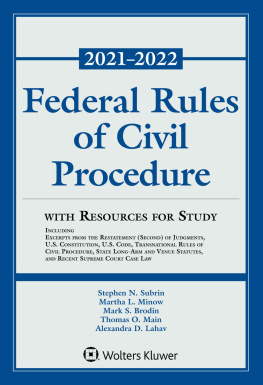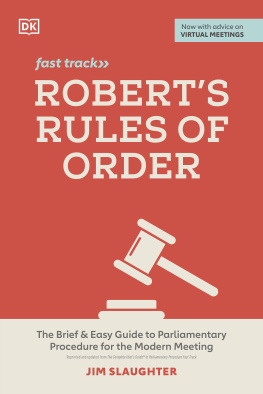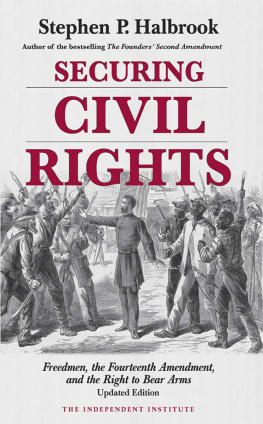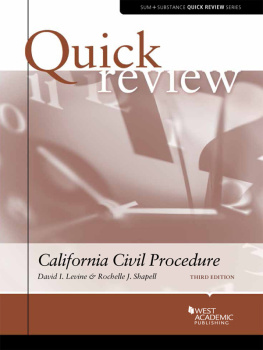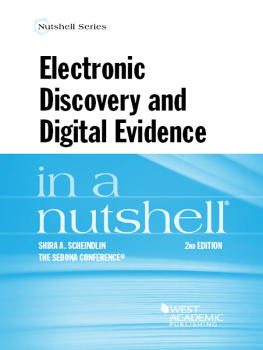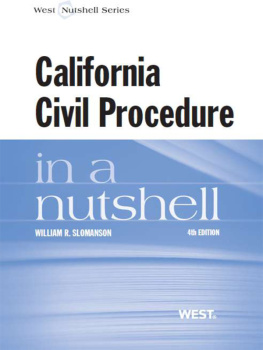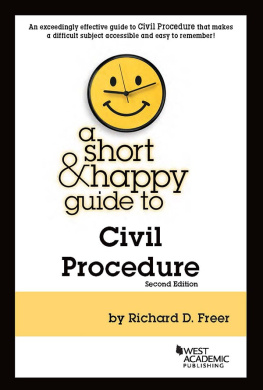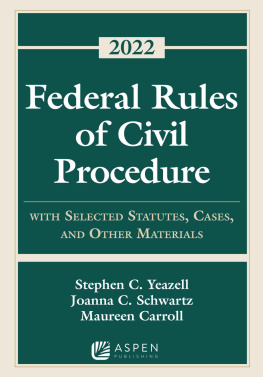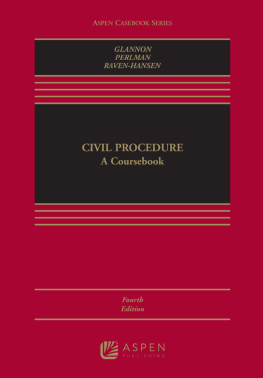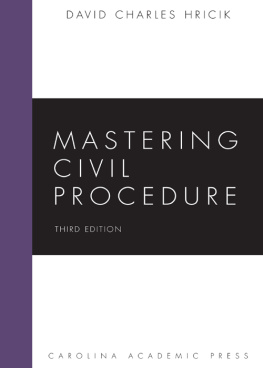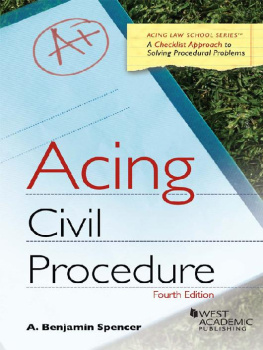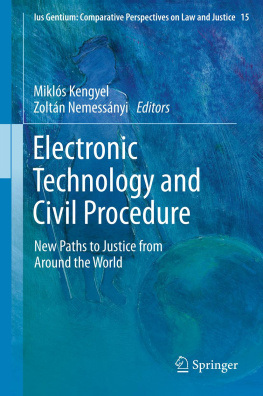i
FEDERAL RULES OF CIVIL PROCEDURE WITH RESOURCES FOR STUDY 2021-2022
ii
EDITORIAL ADVISORS
Rachel E. Barkow
Segal Family Professor of Regulatory Law and Policy
Faculty Director, Center on the Administration of Criminal Law
New York University School of Law
Erwin Chemerinsky
Dean and Jesse H. Choper Distinguished Professor of Law
University of California, Berkeley School of Law
Richard A. Epstein
Laurence A. Tisch Professor of Law
New York University School of Law
Peter and Kirsten Bedford Senior Fellow
The Hoover Institution
Senior Lecturer in Law
The University of Chicago
Ronald J. Gilson
Charles J. Meyers Professor of Law and Business
Stanford University
Marc and Eva Stern Professor of Law and Business
Columbia Law School
James E. Krier
Earl Warren DeLano Professor of Law Emeritus
The University of Michigan Law School
Tracey L. Meares
Walton Hale Hamilton Professor of Law
Director, The Justice Collaboratory
Yale Law School
Richard K. Neumann, Jr.
Alexander Bickel Professor of Law
Maurice A. Deane School of Law at Hofstra University
Robert H. Sitkoff
John L. Gray Professor of Law
Harvard Law School
David Alan Sklansky
Stanley Morrison Professor of Law
Faculty Co-Director, Stanford Criminal Justice Center
Stanford Law School
iii
FEDERAL RULES OF CIVIL PROCEDURE WITH RESOURCES FOR STUDY 2021-2022
Edited By
Stephen N. Subrin
Northeastern University School of Law
Martha L. Minow
Harvard Law School
Mark S. Brodin
Boston College School of Law
Thomas O. Main
University of Nevada, Las Vegas
William S. Boyd School of Law
Alexandra D. Lahav
University of Connecticut School of Law

iv
Copyright 2021 CCH Incorporated. All Rights Reserved.
Published by Wolters Kluwer in New York.
Wolters Kluwer Legal & Regulatory U.S. serves customers worldwide with CCH, Aspen Publishers, and Kluwer Law International products. (www.WKLegaledu.com)
No part of this publication may be reproduced or transmitted in any form or by any means, electronic or mechanical, including photocopy, recording, or utilized by any information storage or retrieval system, without written permission from the publisher. For information about permissions or to request permissions online, visit us at www.WKLegaledu.com, or a written request may be faxed to our permissions department at 212-771-0803.
To contact Customer Service, e-mail , call 1-800-234-1660, fax 1-800-901-9075, or mail correspondence to:
Wolters Kluwer
Attn: Order Department
P.O. Box 990
Frederick, MD 21705
eISBN 978-1-5438-4624-9
v
About Wolters Kluwer Legal & Regulatory U.S.
Wolters Kluwer Legal & Regulatory U.S. delivers expert content and solutions in the areas of law, corporate compliance, health compliance, reimbursement, and legal education. Its practical solutions help customers successfully navigate the demands of a changing environment to drive their daily activities, enhance decision quality and inspire confident outcomes.
Serving customers worldwide, its legal and regulatory portfolio include products under the Aspen Publishers, CCH Incorporated, Kluwer Law International, ftwilliam.com and MediRegs names. They are regarded as exceptional and trusted resources for general legal and practice-specific knowledge, compliance and risk management, dynamic workflow solutions, and expert commentary.
vii
CONTENTS
viii
ix
x
xi
Preface and Acknowledgments
This book was prepared as a resource to supplement any civil procedure course. In addition to the usual fare of Federal Rules, Committee Notes, the U.S. Constitution, and U.S. Code provisions, this supplement includes examples of state long-arm and venue statutes, as well as excerpts from the Restatement (Second) of Judgments, and excerpts from the American Law Institute/UNIDROIT Rules of Transnational Civil Procedure. Inclusion of these materials reflects not only our teaching preferences but also our thoughts about the contours of this rewarding field of study. Space constraints present difficult editorial choices, and we have focused here on the core procedure courses. We welcome any editorial suggestions that you may have for future editions of this supplement.
In this supplement we have integrated into the text of the Federal Rules useful cross-references to relevant external materialsForms, Advisory Committee Notes, Restatement sections, and Transnational Rules. These cross-references appear with the designation: For further study, see. We intend this cross-referencing method to help students explore the larger context of each Federal Rule without having to significantly interrupt the presentation of the Federal Rules themselves.
We also recommend that students frequent the federal judiciarys website at www.uscourts.gov/rules-policies. The rulemaking link on that site provides access to national and local rules currently in effect in the federal courts, contextual information about the rulemaking process, and the status of all pending and proposed procedural rules and legislation.
The authors are grateful to Paula Main for her assistance in producing this book.
ALI/UNIDROIT Principles of Transnational Civil Procedure, copyright 2006 by The American Law Institute for the entire work, and copyright 2006 by UNIDROIT for the Principles only. Reprinted with permission. All rights reserved. This publication is available from Cambridge University Press, www.cambridge.org/uk, however, please make any requests for permission to reprint material from this publication to The American Law Institute at www.ali.org.
Restatement (Second) of Judgments, copyright 1982 by the American Law Institute. Reprinted with permission. All rights reserved.
S.N.S.
M.L.M.
M.S.B.
T.O.M.
A.D.L.
RULES OF CIVIL PROCEDURE FOR THE UNITED STATES DISTRICT COURTS
I. SCOPE OF RULES; FORM OF ACTION
Rule 1. Scope and Purpose
These rules govern the procedure in all civil actions and proceedings in the United States district courts, except as stated in . They should be construed, administered, and employed by the court and the parties to secure the just, speedy, and inexpensive determination of every action and proceeding.
For further study, see 1938 Advisory Committee Notes at 111; 1993 Advisory Committee Notes at 151; 2015 Advisory Committee Notes at 198; and Transnational at 253.
Rule 2. One Form of Action
There is one form of actionthe civil action.
For further study, see Transnational at 255.
II. COMMENCING AN ACTION; SERVICE OF PROCESS, PLEADINGS, MOTIONS, AND ORDERS
Rule 3. Commencing an Action
A civil action is commenced by filing a complaint with the court.
For further study, see Transnational at 255.
Rule 4. Summons
(a) Contents; Amendments
- Contents. A summons must:
- name the court and the parties;
- be directed to the defendant;
- state the name and address of the plaintiffs attorney orif unrepresentedof the plaintiff;
- state the time within which the defendant must appear and defend;
- notify the defendant that a failure to appear and defend will result in a default judgment against the defendant for the relief demanded in the complaint;
Next page
